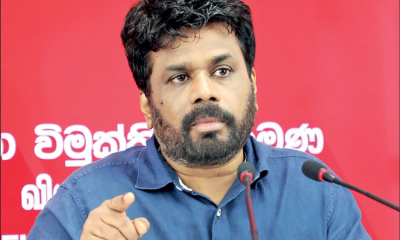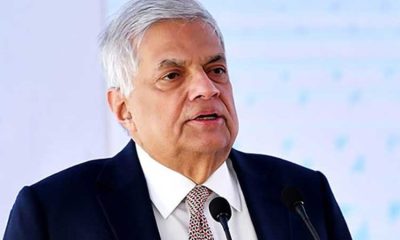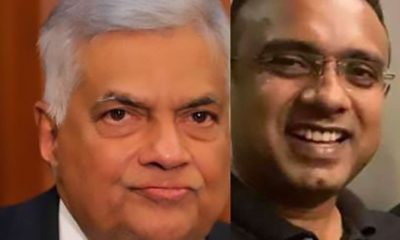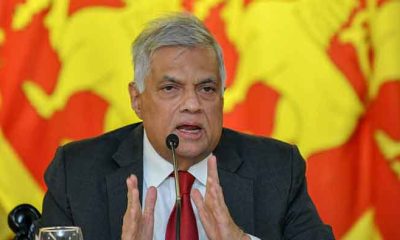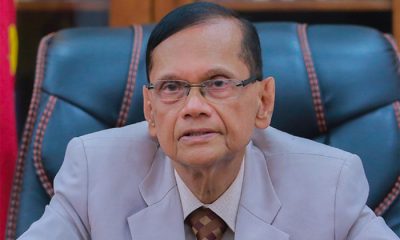Editorial
Inspiring young minds

Friday 13th October, 2023
A model parliamentary session held by a group of schoolchildren from Ratnapura, at the Presidential Secretariat, on Tuesday, has received much publicity. President Ranil Wickremesinghe, addressing the students, asked them to suggest solutions to their problems. The government was willing to consider them, he added.
Tuesday’s event has come in for criticism on social media. Some critics have called it an utter waste of time and energy, and argued that children should be taught to spend their time productively without engaging in fruitless pursuits, but such criticism, in our book, is misplaced. Parliament is an integral part of democracy, and theoretically model parliaments or simulated legislative assemblies are intended to promote civic education, help students or the youth gain a deeper understanding of how parliamentary process works and provide them with opportunities to develop skills in public speaking, debating and critical thinking.
Negative comments about the mock parliament emanate from the people’s antipathy towards the present-day legislators and the deterioration of the parliamentary process. The blame for this unfortunate situation should be apportioned to the public as well; it is they who elect their representatives. In a democracy, the people are said to get the governments they deserve, and the same may be said of parliaments as well.
However, the general consensus is that the current legislature needs to be given a radical shake-up. This task requires a Herculean effort like the one that went into the cleaning of the Augean stables. Going by what has been reported of Tuesday’s model parliamentary session, there is a lot that our MPs could and should learn from schoolchildren. In fact, on seeing the appalling conduct of some of the legislators, one wonders whether they missed early childhood education, which provides a solid base for learning abilities and cognitive and social development.
Schoolchildren who go on excursions to the zoo and Parliament during stormy sessions might wonder which is which, and, most of all, why it is the harmless, dumb creatures that are kept in cages, and not the aggressive ones that go berserk at the drop of a hat. There have been instances where schoolchildren in the public gallery of Parliament let out screams on seeing rowdy scenes below, with the MPs trading blows and raw filth liberally. It is a matter for relief that children are not emulating those legislators.
It is said that there is no way one can isolate oneself from politics unless one isolates oneself from society. But one important lesson that should be imparted to children in school is that one does not necessarily have to engage in active politics to be able to make a significant contribution to the wellbeing of one’s country. There are many other ways of serving the public and achieving success in life. But when children see professors and other such learned persons in politics kowtowing to semi-literate ministers, they are likely to get the wrong message that it is prudent to drop out of school as early as possible, engage in politics and become ministers.
There is a pressing need for children to be educated on civic and political rights of the public and inspired to cherish justice, fair play, unity in diversity and equality so that the current practice of deifying politicians, especially the parasitic ones with dictatorial traits, will end, and future generations will have the courage to stand up for themselves. For this goal to be achieved, undue social recognition for politicians has to be diminished. Hence, care should be taken to prevent model parliaments from creating an impression in young minds that politicians are a cut above others. Children must be taught and encouraged to think differently and critically and question the retrogressive policies, traditions and beliefs.
Teachers ought to set an example to their students by refraining from tugging their forelocks before politicians. They must overcome the absurd mindset that no school function is complete without the presence of politicians. There are many brilliant Sri Lankans of all ages who have excelled in their chosen fields and made this country proud. It is they who deserve pride of place. Tharushi Karunarathne’s stellar performance at the recently-concluded Asian Games proved an enormous uplift for a despondent nation mired in deep crisis.
The 18-year-old lass, a proud member of the Raramuri squad of the Walala Rathnayake Central College, as it were, was poetry in motion, and ‘even the ranks of Tuscany could scarce forbear to cheer’ when she clinched the gold medal in the women’s 800m. But if not for her coach, Susantha Fernando, who spotted her talent and turned her into a formidable half-miler who moves like the breeze, Tharushi would have ended up being another Lucy of Lanka in a far-flung hamlet––‘a violet by a mossy stone/Half-hidden from the eye!’ Susantha has trained dozens of athletes, and the international medals he has helped the country win, all these years, number more than three scores. It is such selfless, unsung heroes/heroines who should be invited to grace ceremonies, as chief guests, especially in schools. That, we believe, is the way to foster meritocracy for the benefit of children.
Editorial
Easter Sunday Carnage: Probes and politics

Thursday 26th February, 2026
The CID yesterday arrested former Military Intelligence Chief Major General (Retd.) Suresh Sallay in connection with the ongoing investigations into the Easter Sunday terror attacks (2019). Police Spokesman ASP F. U. Wootler told a hurriedly summoned media briefing that the arrest of Sallay was based on credible evidence. If so, the burden is on the police to prove their very serious charges against the war-time military intelligence officer who played a pivotal role in eliminating LTTE terror. Otherwise, they will have to face the consequences of their actions when their current political masters lose power. It amounts to a grave violation of fundamental rights to arrest people without sufficient grounds and hold them on remand for extended periods.
Everything possible must be done to trace the masterminds behind the Easter Sunday carnage and bring them to justice. However, efforts to ensure that justice is served must be devoid of partisan politics. The unprecedented politicisation of the CID under the current dispensation has severely undermined the integrity of the investigations into the Easter Sunday terror attacks. The CID is now under two former senior police officers, namely ex-SDIG Ravi Seneviratne and ex-SSP Shani Abeysekera. While in active service, they reduced the CID to a mere appendage of the UNP-led Yahapalana government and were accused of launching politically motivated probes and arresting the political opponents of that failed regime. They themselves have been accused of failing to act on warnings to prevent the 2019 terror attacks. Both Seneviratne and Abeysekera joined the Retired Police Collective of the JVP/NPP, which, after forming a government in 2024, brought them out of retirement and appointed them as Secretary to the Public Security Ministry and CID Director, respectively. They have to advance the incumbent government’s agenda as a quid pro quo for their elevation to the current positions.
Whenever the JVP-NPP government faces trouble on the political front, the police come to its aid, making high-profile arrests. So, the Opposition’s argument that the CID has arrested Sallay to distract public attention from the mega coal scam, which has sent the government reeling, is not without merit. Most of all, with the seventh anniversary of the Easter Sunday carnage only about two months away, the government needs to show that it is on course to fulfil its pledge to bring the terror masterminds to justice.
Curiously, one main aspect of the Easter Sunday carnage continues to be ignored; it is the alleged foreign involvement therein. Dr. Wijeyadasa Rajapakshe, who was the Justice Minister in the Yahapalana government, taking part in a Sirasa TV programme in the run-up to the 2024 presidential election hinted at the possibility of some world powers having had a hand in the Easter Sunday bombings. He said that he had opposed the handing over of the strategically important Hambantota Port to China in 2017, warning the Yahapalana Cabinet that another world power would seek to take control of the Trincomalee harbour, the oil tank farm near it, and the Colombo Port, and that if Sri Lanka did not grant those demands, it would be plunged into a bloodbath and forced into submission. He said the Yahapalana administration had ignored his warning and gone ahead with the Hambantota Port deal, and three months later his prediction had come true; the US asked for the Trincomalee harbour with land around it, and India demanded that the Trinco oil tanks and the East Terminal of the Colombo Port be handed over to it. Prime Minister Ranil Wickremesinghe had sought to grant those demands and presented a bill to Parliament to amend the Land Ordinance, Dr. Rajapakshe said, adding that he had moved the Supreme Court successfully, aborting the Yahapalana government’s bid to hand over the Trincomalee harbour and land. That administration’s attempt to grant India’s demand had come a cropper due to protests, and a few months later, the Easter Sunday attacks had happened, Dr. Rajapakshe said, drawing parallels between the destabilisation of Sri Lanka and that of Bangladesh.
If one reads between the lines, it may not be difficult to figure out what Dr. Rajapakshe chose to leave unsaid. He is not alone in claiming that there was a foreign hand in the 2019 terrorist bombings. Speaking at St. Sebastian’s Church, Katuwapitiya, on 21 July 2019, Archbishop of Colombo Malcolm Cardinal Ranjith flayed President Maithripala Sirisena and Prime Minister Ranil Wickremesinghe for having failed to resist the foreign conspiracy to destabilise the country.
Among the key witnesses who expressly testified before the Presidential Commission of Inquiry (PCoI) on the Easter Sunday terror attacks that there had been ‘an external hand or conspiracy behind the attacks’, were Cardinal Ranjith, Ravi Seneviratne, Shani Abeysekera and SDIG Nilantha Jayawardena, who said an Indian named Abu Hind ‘may have triggered the attacks’. Abu Hind was a character created by a section of a provincial Indian intelligence apparatus, and the intelligence the Director SIS received on 4th, 20th and 21st April, 2019 about the terror attacks was from this operation and the intelligence operative pretending to be one Abu Hind, according to an international terrorism expert who testified before the PCoI. In an interview with BBC in 2019, Dr. Nalinda Jayatissa declared that according to ‘investigative evidence’ he was privy to, India had been behind the Easter Sunday terror attacks. Curiously, the alleged foreign involvement in the Easter Sunday terror attacks has been ignored.
A thorough probe must be conducted into the alleged foreign involvement in the 2019 terror attacks, which may have been the beginning of a sinister campaign to make Sri Lanka’s economy scream in 2022, as we have argued in a previous comment.
Editorial
Corruption: Saataka and double pockets

Wednesday 25th February, 2026
The JVP-NPP government has irreparably blackened its reputation with low-grade coal. Laboratory tests have confirmed that all eight shipments of coal supplied by a new company to the Norochcholai power plant are substandard. To make matters worse, Opposition Leader Sajith Premadasa has claimed that the ninth shipload of coal is also substandard.
There was a time when the JVP leaders vehemently condemned the Presidents and ministers of the day as kleptocrats and vowed to end the culture of impunity and uphold accountability if voted into power. They were instrumental in ousting the Mahinda Rajapaksa government, which they described as the most corrupt regime in Sri Lanka, and installing the UNP-led Yahapalana administration in 2015. A couple of weeks into office, those who came to power promising good governance committed a Treasury bond scam. Something similar has happened under the JVP-led dispensation.
A few weeks after the formation of the JVP-NPP government, as many as 323 red-flagged freight containers were green-channelled. The government is conducting a sham probe into the container scandal, and it reminds us of the bogus investigation conducted by a group of UNP lawyers into the Treasury bond scams in 2015.
The shameful manner in which the JVP/NPP leaders are trying to cover up the coal scandal reminds us of Prime Minister Ranil Wickremesinghe’s denial of Treasury bond scams in 2015. The JVP was an ally of the UNP-led Yahapalana government when the Treasury bond scams were committed, and it continued to support the UNP until the 2019 presidential election. PM Wickremesinghe sought to ridicule the Opposition, which raised the bond issue in Parliament; he audaciously claimed that the Opposition MPs did not know a Treasury bond from James Bond. The UNP was accused of having raised funds for its election campaigns through the Treasury bond scams. The current Opposition says the JVP has benefited from the coal scams and that is why the government is defending Energy Minister Kumara Jayakody to the hilt.
It has been revealed in Parliament that the JVP-NPP government arbitrarily extended the closing date for the coal tender and revised the eligibility criteria in favour of the company responsible for the substandard coal imports.
The company that won the coal tender is alleged to have a history of supplying low-quality goods to Sathosa, and its owner and local agent are reportedly under a cloud. A complaint has been lodged with the Commission to Investigate Allegations of Bribery or Corruption against Minister Jayakody over alleged misappropriation of state funds when he was in the Fertiliser Corporation. It is against this backdrop that the coal scam should be viewed.
There is no way the government can justify taking delivery of low-grade coal imports on the grounds that fines are imposed on the supplier. According to tender guidelines, all coal shipments supplied by the new company should have been rejected outright as their calorific values were below the stipulated minimum levels. The supplier will not mind being fined because it can still make profits by supplying unsaleable, low-quality coal to the CEB.
When a racket of procuring substandard and fake medicines came to light during the previous government, the JVP leaders let out a howl of protest, demanding the arrest of the then Health Minister Keheliya Rambukwella and some Health Ministry panjandrums—and rightly so. They insisted that the fraudulent procurement could not have happened unbeknownst to Rambukwella, who authorised the purchase of low-quality drugs and fake immunoglobulin. But they are now defending Energy Minister Jayakody vis-à-vis the Opposition’s demand that he be sacked and prosecuted for the procurement of substandard coal which has caused huge losses to the state coffers. The CEB has recently revealed before a Parliamentary Sectoral Oversight Committee that direct losses from eight shipments of substandard coal amount to Rs. 7,672 million.
The JVP has portrayed the Rajapaksas’ saataka as a symbol of corruption. Unless the incumbent government cancels the questionable coal tender forthwith, removes Minister Jayakody from the Cabinet, and establishes an independent probe, its opponents may say the JVP leaders’ ‘double pockets’ symbolise their double standards on corruption.
Editorial
Curtains for Mexican drug cartel boss

Tuesday 24th February, 2026
The Mexican military on Sunday killed a drug lord, described as the most powerful cartel leader in Mexico. Nemesio Ruben Oseguera Cervantes aka El Mencho perished in a clash with the Mexican armed forces backed by US intelligence. Mencho was known the world over for his well-established drug distribution network. Members of the slain criminal’s cartel went berserk, torching vehicles and fuel stations in several parts of Mexico. They also blocked some highways with burning vehicles.
Mexican President Claudia Sheinbaum praised the armed forces for the successful operation. It is hoped that military operations will continue until the violent gangs are neutralised once and for all. There is no future for a country that is in the clutches of drug barons and terrorists.
Mexico is now doing, on President Sheinbaum’s watch, what it should have done decades ago. Mexico has been home to several powerful drug cartels, such El Mencho’s CJNG (Jalisco New Generation Cartel), Sinaloa Cartel, Beltran -Leyva Organisation and Los Zetas. They have been in the news globally, and their narcotic operations have affected the entire world. CJNG has a global network, which distributes dangerous drugs, such as fentanyl, methamphetamine, cocaine and heroin. Among the powerful cartel leaders, killed by the Mexican military during the past several decades, was Torres Felix; he was shot dead in 2012. However, there has never been an all-out war on drugs as such in Mexico.
One may recall that President Felipe Calderón sent the Mexican military into the cartel-controlled regions in 2006, marking an escalation in Mexico’s approach to the drug menace, but the narcotic cartels have been far from weakened. That operation made international headlines. If successive Mexican governments had taken on the drug cartels with might and main, perhaps the likes of El Mencho would not have emerged so powerful as to raise well-equipped private armies and run parallel governments.
Successful military operations against powerful drug cartels in Mexico, etc., stand all countries in good stead, for they lead to a decrease in the international narcotics supply. Sri Lanka has been a victim of foreign drug cartels that operate through local agents, most of whom are based in Dubai and other havens for criminals. The incumbent government has embarked on a campaign to rid the country of the scourge of narcotics, and operations during the past one and a half years or so have yielded a lot of banned substances and helped net some powerful drug dealers. These operations must go on.
The local underworld is controlled by drug barons and their hit squads have demonstrated their ability to strike at will. A soldier-turned Sicario, arrested over the recent double murder near the Tri-forces Headquarters complex in Akuregoda, is alleged to have committed 10 murders. He has been working for a drug lord residing overseas. There are many other such hitmen in the pay of drug barons, and all of them must be hunted down to make this country safe.
In 2020, while being detained in the Boosa Prison, Podi Lassi and two other drug dealers, known as Kosgoda Tharaka and Pitigala Keuma threatened to harm the then President Gotabaya Rajapaksa, Defence Secretary General Kamal Gunaratne, and some senior prison officers. They bragged that although they were behind bars, their hit squads were out there and ready to carry out their orders. Such is their power.
In September 2023, Nadun Chinthaka Wickremaratne alias Harak Kata almost made good his escape during an interrogation session at the CID headquarters. His plan to poison the police personnel on duty, and flee went pear-shaped thanks to some Argus-eyed STF personnel. It was subsequently revealed that Harak Kata had planned to use several commandos in the rescue operation. In November 2023, a military sniper was taken into custody for his alleged involvement in the plot to spring free Harak Kata and Kudu Salindu from the CID. A Lt. Colonel of the Army Commando Regiment was arrested for supplying ammunition to drug dealer Kehelbaddara Padme’s bodyguard, ‘Commando Salintha’. Besides, more than a dozen Police Narcotics Bureau officers were arrested in 2020 over their links to drug dealers. This shows how well established the drug Mafia in this country is.
Minister of Public Security Ananda Wijepala, revealing the progress in investigations into the Akuregoda double murder and fielding questions from the Opposition, in Parliament, the other day, claimed one of the Opposition local councillors in the Southern Province had underworld links. Narcotics and politics are conjoined twins. Drug dealers are known to lavish funds on politicians and manipulate them. Hence, the need for thorough background checks to be conducted on all people’s representatives. Most of all, it needs to be found out whether there is any truth in the allegation that notorious drug dealer in exile, Kudu Lal, sponsors some local councillors in Colombo, and influenced the outcome of a mayoral election, with their help.
-

 Features5 days ago
Features5 days agoWhy does the state threaten Its people with yet another anti-terror law?
-

 Features5 days ago
Features5 days agoReconciliation, Mood of the Nation and the NPP Government
-

 Features5 days ago
Features5 days agoVictor Melder turns 90: Railwayman and bibliophile extraordinary
-

 Features4 days ago
Features4 days agoLOVEABLE BUT LETHAL: When four-legged stars remind us of a silent killer
-

 Features5 days ago
Features5 days agoVictor, the Friend of the Foreign Press
-

 Latest News6 days ago
Latest News6 days agoNew Zealand meet familiar opponents Pakistan at spin-friendly Premadasa
-

 Latest News6 days ago
Latest News6 days agoECB push back at Pakistan ‘shadow-ban’ reports ahead of Hundred auction
-

 Latest News6 days ago
Latest News6 days agoTariffs ruling is major blow to Trump’s second-term agenda


